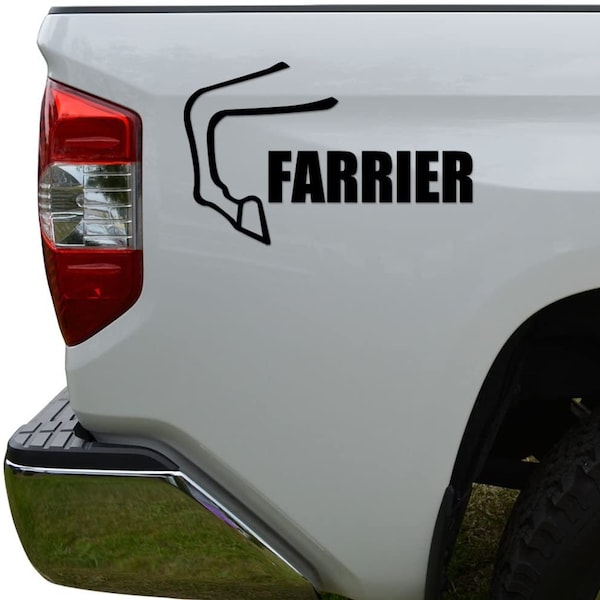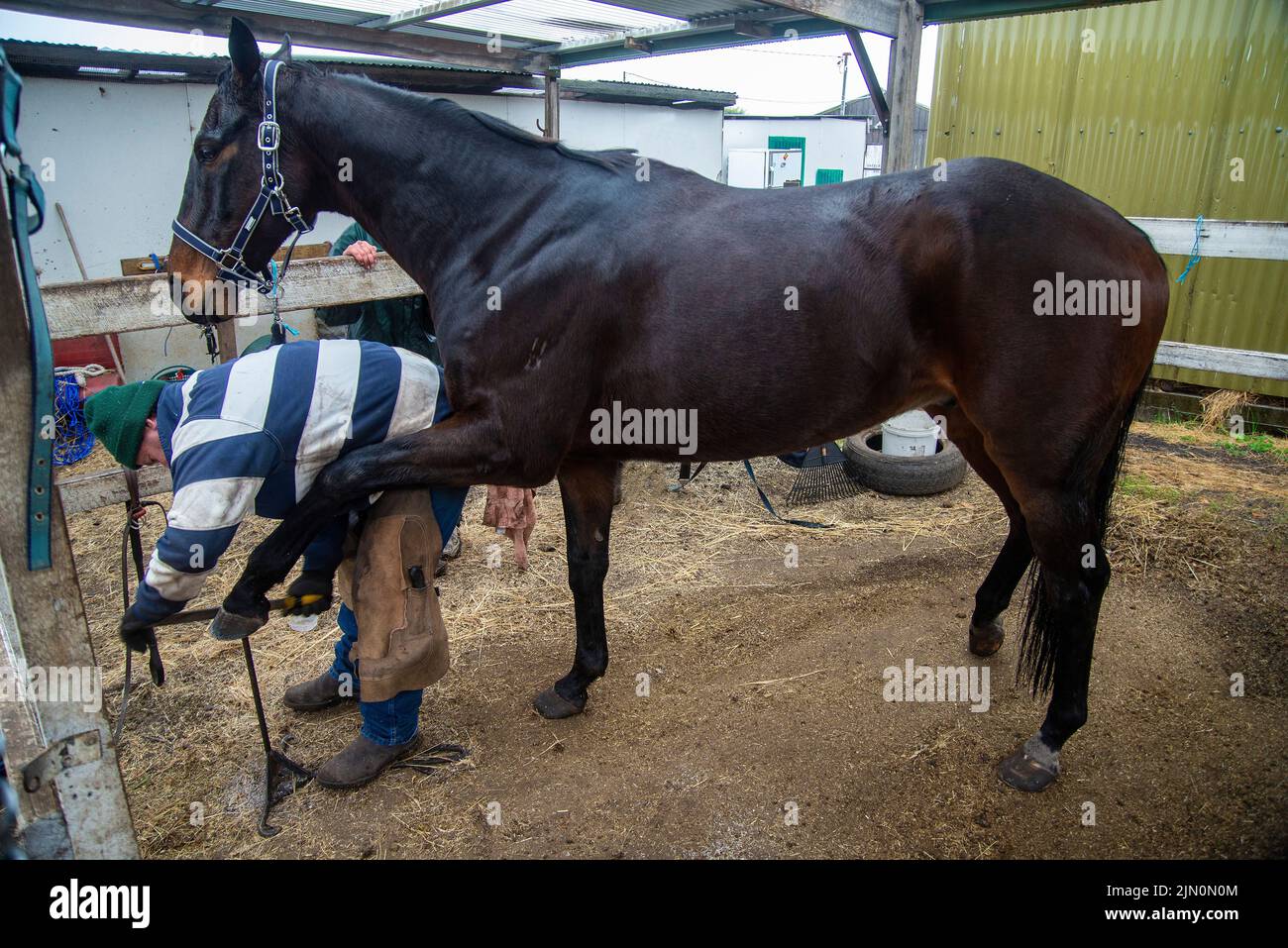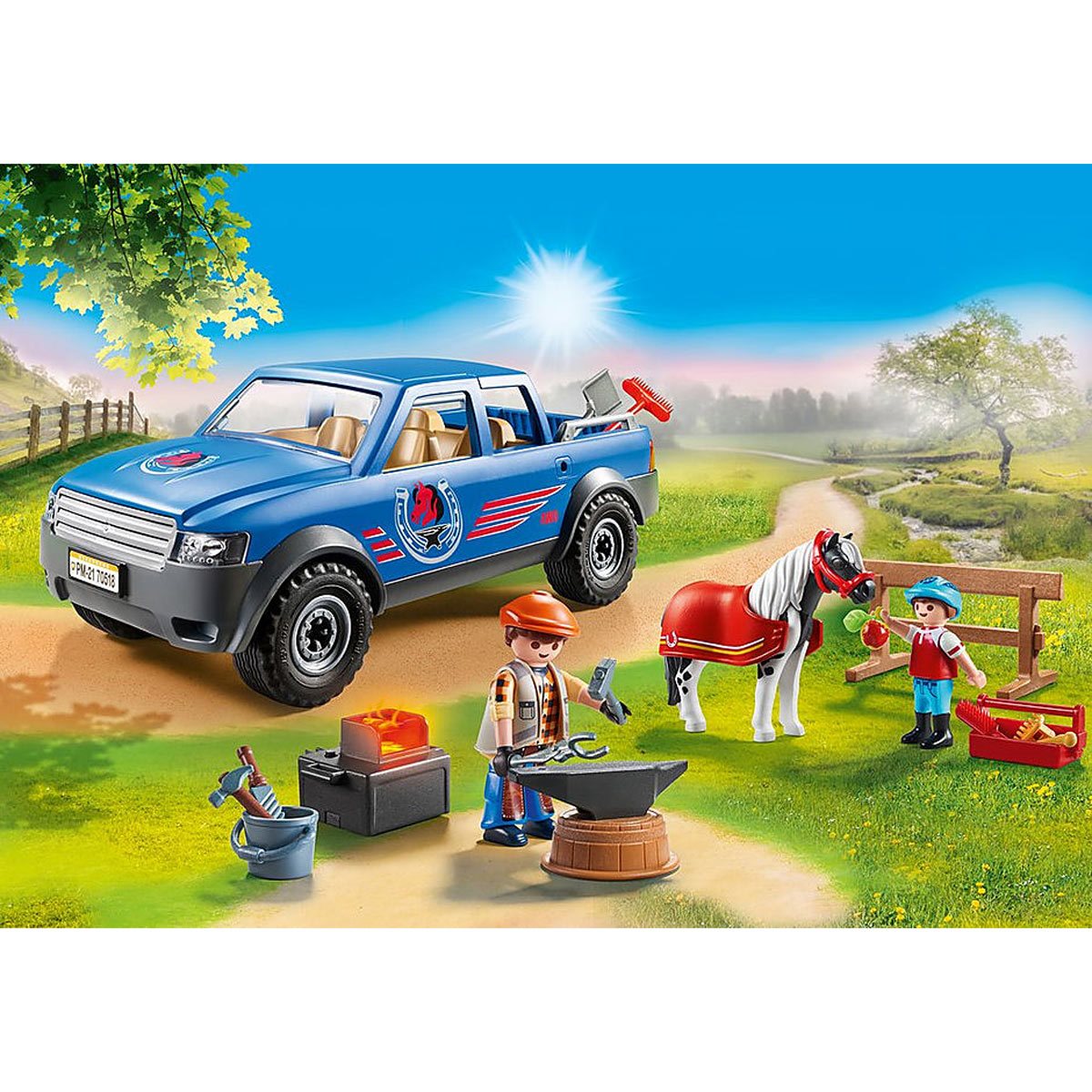The Farrier Truck: A Mobile Forge and Workshop on Wheels types.truckstrend.com
Introduction: The Backbone of Modern Farriery
In the world of equine care, the farrier plays an indispensable role, ensuring the health, comfort, and performance of horses through expert hoof care. From routine trims to therapeutic shoeing, the farrier’s work is precise, demanding, and often performed on the go. This mobile nature necessitates a specialized vehicle capable of transporting an array of heavy tools, a portable forge, and various supplies, all while maintaining an organized and efficient workspace. This is where the Farrier Truck comes into its own – not just a mode of transport, but a meticulously designed, mobile workshop that serves as the backbone of every professional farrier’s operation. It is a testament to preparedness, professionalism, and the dedication required to deliver top-tier hoof care wherever a horse may be.
The Farrier Truck: A Mobile Forge and Workshop on Wheels
What is a Farrier Truck?
At its core, a Farrier Truck is a highly customized vehicle, typically a pickup truck or a cargo van, specifically outfitted to serve as a comprehensive mobile workstation for a farrier. Unlike a standard work truck, a Farrier Truck is engineered with specialized storage solutions, power systems, and safety features tailored to the unique demands of horseshoeing. It carries everything from anvils and forges to grinders, nippers, rasps, and a vast assortment of horseshoes and materials. The goal is to bring the functionality of a fixed farrier shop directly to the horse, whether it’s at a private stable, a sprawling ranch, or a competitive event.
Why a Dedicated Farrier Truck is Essential
For the modern farrier, a dedicated truck is not merely a convenience; it’s a critical investment that profoundly impacts efficiency, professionalism, and safety.
- Enhanced Efficiency and Organization: Time is money. A well-organized Farrier Truck means tools are easily accessible, reducing wasted time searching for equipment. Every item has its place, streamlining workflow and allowing the farrier to focus on the horse.
- Professional Image: Arriving in a clean, organized, and purpose-built vehicle immediately conveys professionalism and competence to clients. It instills confidence and reflects positively on the farrier’s commitment to their craft.
- Safety and Security: Farriery involves heavy, sharp, and potentially hazardous tools. A dedicated truck provides secure storage, preventing tools from shifting during transit and minimizing the risk of injury. It also protects valuable equipment from theft and the elements.
- Mobility and Versatility: Horses are not always in ideal locations. A Farrier Truck enables access to remote stables, paddocks, and emergency call-outs, ensuring that quality hoof care is always within reach.
- Optimized Workspace: With built-in work surfaces, power outlets, and often dedicated ventilation for a forge, the truck transforms into a functional workspace, regardless of the on-site conditions.
- Durability and Longevity: These trucks are designed to withstand the rigors of heavy loads, constant use, and varied terrain, ensuring a longer service life for both the vehicle and the specialized equipment it carries.

Key Components and Features of a Farrier Truck

A truly effective Farrier Truck integrates several key features to support the farrier’s daily operations:
- Specialized Storage Solutions: This is paramount. Custom drawers, shelves, bins, and compartments are designed to hold specific tools (e.g., nippers, rasps, hammers), various sizes of horseshoes, nails, and therapeutic materials. They are often heavy-duty, lockable, and resistant to rust and wear.
- Work Surfaces and Anvil Mounts: A sturdy, secure mount for the anvil is essential for forging and shaping shoes. Many trucks also feature retractable or fixed workbench areas for smaller tasks and tool setup.
- Forge Accommodation and Ventilation: For farriers who hot shoe, a dedicated, well-ventilated space for a propane forge is crucial. Proper ventilation (fans, vents, exhaust systems) is non-negotiable for safety, preventing the buildup of harmful fumes.
- Power Solutions: On-board power is vital for running electric grinders, drills, lighting, and other tools. This can be provided by a generator, a robust inverter system connected to the vehicle’s battery, or a combination of both. Multiple outlets are typically integrated throughout the workspace.
- Lighting: Adequate interior lighting ensures visibility for finding tools and working, especially in low-light conditions. Exterior work lights are also common for early morning or late evening appointments.
- Water and Air Systems (Optional but Beneficial): Some advanced setups include small water tanks and pumps for washing hands or tools, and air compressors for cleaning or powering pneumatic tools.
- Safety Features: Beyond secure storage, standard safety equipment includes fire extinguishers, first-aid kits, and proper securing mechanisms for heavy items like the anvil and forge.

Types of Farrier Truck Setups
Farrier trucks come in various configurations, each with its own advantages:
- Pickup Truck with Canopy/Cap: A very popular choice, offering a balance of cost-effectiveness and functionality. The bed is enclosed by a custom-fitted cap, allowing for internal shelving, drawers, and secure storage. It maintains the maneuverability of a pickup.
- Pickup Truck with Service Body (Utility Body): This is a more professional and durable option. The standard truck bed is replaced with a purpose-built utility body featuring integrated, weather-sealed compartments on the exterior. These offer superior organization and protection, often with heavy-duty construction.
- Cargo Van: Vans offer a completely enclosed, climate-controlled environment, which can be advantageous in extreme weather conditions. They provide excellent security and a large interior space for custom build-outs. However, they can be less suitable for extremely heavy items like very large anvils, and ventilation for a forge requires careful planning.
- Custom Chassis/Trailer Setups: For farriers with extensive equipment or those working primarily from a fixed location with occasional mobile needs, larger custom builds on a truck chassis or even dedicated trailers can provide maximum space and customization.
Designing Your Ideal Farrier Truck Layout
Planning is key to a highly functional Farrier Truck. Consider the following:
- Assess Your Needs: List every tool, supply, and piece of equipment you carry. Think about their weight, size, and how frequently you use them.
- Map Your Workflow: Visualize your typical workday. What tools do you need first? What should be near the forge? Organize items logically based on your work process.
- Prioritize Weight Distribution: Heavy items (anvil, forge, generator) should be placed low and centered in the vehicle to maintain stability and prevent excessive wear on suspension components. Always stay within the vehicle’s Gross Vehicle Weight Rating (GVWR).
- Maximize Accessibility: Frequently used tools should be easily reachable without excessive bending or stretching. Tools used less often can be stored in less accessible areas.
- Ensure Ventilation: If you hot shoe, dedicate ample space for your forge with a robust ventilation system (fans, exhaust ports) to expel fumes safely.
- Consider Security: Integrate sturdy locks on all compartments. If possible, choose a setup that allows you to secure the vehicle and its contents overnight.
- Plan for Power: Determine your power needs. Will an inverter suffice, or do you need a generator? Plan for the placement of outlets, battery banks, and charging systems.
- Budget Realistically: Custom builds and high-end equipment come at a cost. Balance your ideal setup with what’s financially feasible, considering both initial outlay and long-term maintenance.
Maintenance and Safety Considerations
A Farrier Truck is a significant investment that requires diligent maintenance and adherence to safety protocols.
- Vehicle Maintenance: Regular checks on tires (especially pressure and wear due to heavy loads), brakes, suspension, and fluid levels are crucial. Heavy-duty shocks and springs may be necessary.
- Equipment Maintenance: Keep tools clean and sharp. Inspect forge hoses and connections regularly for leaks. Ensure grinders are in good working order and wheels are properly secured.
- Load Securement: All tools and equipment, especially heavy items like the anvil and forge, must be securely fastened to prevent shifting during transit, which can cause damage or injury.
- Ventilation Safety: Always ensure adequate ventilation when operating a forge to prevent carbon monoxide buildup. Never operate a forge in an enclosed space without proper exhaust.
- Fire Safety: Carry a fire extinguisher rated for flammable liquids (Class B) and electrical fires (Class C), and know how to use it.
- Personal Protective Equipment (PPE): While not truck-specific, always have appropriate PPE (safety glasses, gloves, ear protection, apron) readily available in the truck.
Challenges and Solutions
Even the most well-designed Farrier Truck can present challenges:
- High Initial Cost: A fully outfitted Farrier Truck can be a substantial investment.
- Solution: Start with a reliable used vehicle. Consider a phased approach to adding custom features, or explore DIY options for shelving and storage. Financing options are also available.
- Weight and Fuel Economy: Heavy loads reduce fuel efficiency and increase wear and tear on the vehicle.
- Solution: Optimize packing to reduce unnecessary weight. Invest in heavy-duty suspension components. Consider a diesel engine for better torque and potentially better fuel economy under load.
- Organization Drift: Over time, trucks can become disorganized.
- Solution: Implement a strict "a place for everything" rule. Dedicate time weekly for cleaning and reorganization.
- Theft of Valuables: Farrier tools and equipment are highly desirable targets.
- Solution: Invest in robust locks for all compartments. Consider an alarm system. Always park in well-lit, secure areas.
- Extreme Weather Conditions: Heat, cold, and rain can impact tools and the farrier’s comfort.
- Solution: For vans, consider insulation and climate control. For pickups, ensure all compartments are weather-sealed.
Practical Advice for Farriers
- Start with a Reliable Chassis: A sturdy, well-maintained truck or van is the foundation. Don’t skimp on the base vehicle.
- Prioritize Safety: Ventilation for the forge and secure tool storage are non-negotiable.
- Invest in Quality Storage: Durable, well-designed drawers and shelves will save you time and frustration in the long run.
- Plan Your Layout Meticulously: A few hours spent sketching and measuring before building can save countless hours of frustration later.
- Don’t Overload: Always respect your vehicle’s GVWR. An overloaded truck is unsafe and will break down faster.
- Network: Talk to other farriers about their truck setups. What works for them? What would they do differently?
Farrier Truck Price Guide (Estimates)
The cost of a Farrier Truck varies significantly based on whether you buy new or used, the level of customization, and the quality of components. This table provides broad estimates for various configurations:
| Component/Setup Type | Estimated Price Range (USD) | Notes |
|---|---|---|
| I. Vehicle Chassis | ||
| Used Pickup/Van | $10,000 – $35,000+ | Depends heavily on mileage, condition, year, and make/model. |
| New Pickup/Van | $35,000 – $70,000+ | Base models to higher trims suitable for heavy loads. |
| II. Upfit/Body Options | ||
| Basic DIY Interior | $500 – $3,000 | Simple wooden shelving, bins, and basic organization. |
| Aftermarket Truck Cap/Canopy | $2,000 – $5,000 | Encloses the bed; requires internal customization. |
| Service Body/Utility Body | $5,000 – $15,000+ | Replaces the standard truck bed; durable, integrated compartments. |
| Professional Custom Interior (Van/Cap) | $5,000 – $25,000+ | Bespoke drawers, shelving, work surfaces, and specialized mounts. |
| III. Key Equipment (New) | ||
| Portable Forge | $500 – $2,000 | Propane models, single to double burner. |
| Anvil | $500 – $3,000 | Various weights and types (e.g., Fisher, Refflinghaus, NC Tool). |
| Power Grinder | $200 – $1,000 | Angle grinders, belt grinders, and specialized farrier grinders. |
| Basic Hand Tools Set | $1,000 – $5,000+ | Nippers, rasps, hammers, clinchers, pull-offs, etc. |
| Generator/Inverter | $500 – $3,000 | For powering electric tools on-site. |
| IV. Total Estimated Cost (Overall Ranges) | Highly variable based on choices | |
| Basic Used Setup | $15,000 – $40,000 | Used vehicle, DIY or basic pre-built interior, essential used tools. |
| Mid-Range Professional Setup | $40,000 – $80,000 | Newer used vehicle or base new, service body/professional interior, quality new tools. |
| High-End New Custom Build | $80,000 – $150,000+ | New vehicle, bespoke custom body/interior, top-tier equipment, advanced features. |
Note: These prices are estimates and can fluctuate significantly based on brand, features, geographic location, and market conditions. Always obtain detailed quotes from suppliers and upfitters.
Frequently Asked Questions (FAQ)
Q1: How much does a Farrier Truck cost?
A1: The cost varies widely, from $15,000 for a basic used setup to over $150,000 for a high-end, custom-built new vehicle. Refer to the price guide above for a detailed breakdown of components.
Q2: Can I just use a regular pickup truck or van without customization?
A2: While you can transport tools in any vehicle, a dedicated, customized Farrier Truck offers significant advantages in terms of organization, efficiency, safety, and professionalism. Loose tools can be dangerous and inefficient.
Q3: What’s better for a Farrier Truck: a van or a pickup with a cap/service body?
A3:
- Van: Offers enclosed, often climate-controlled space, excellent security, and a large interior for customization. Can be limiting for very large anvils or extensive hot shoeing ventilation.
- Pickup with Cap/Service Body: Generally offers easier access to tools from multiple sides (especially with a service body), better ventilation for a forge, and the ability to handle heavier loads. Less climate-controlled unless specifically insulated. The best choice depends on individual preferences, specific needs, and climate.
Q4: What are the most important features to prioritize in a Farrier Truck?
A4: Secure and organized storage, proper ventilation (if hot shoeing), reliable power solutions for tools, and robust work surfaces are paramount. Safety features like secure tool mounts and a fire extinguisher are also critical.
Q5: How do I ensure safety when working with a forge in my truck?
A5: Proper ventilation is absolutely essential. Install powerful exhaust fans and ensure good airflow. Always use your forge in a well-ventilated area, never in an enclosed space without adequate exhaust. Regularly check propane lines and connections for leaks, and always have a fire extinguisher readily accessible.
Q6: Is a Farrier Truck worth the investment?
A6: Absolutely. For professional farriers, a dedicated truck is an indispensable asset. It significantly enhances efficiency, elevates your professional image, ensures safety for you and your equipment, and ultimately contributes to the longevity and success of your farriery business. It’s an investment in your career and your ability to provide top-tier care.
Conclusion: The Mobile Mastery of the Farrier
The Farrier Truck is far more than just a vehicle; it is a meticulously engineered mobile workshop, an essential partner to the skilled hands of a farrier. It embodies the precision, dedication, and adaptability required in a profession that blends craftsmanship with animal husbandry. By providing a safe, organized, and efficient environment for tools and supplies, the Farrier Truck empowers professionals to deliver expert hoof care wherever a horse may be, reinforcing their role as vital contributors to equine health and performance. Investing in a well-designed and maintained Farrier Truck is not just a practical decision; it’s a commitment to excellence that underpins the very foundation of modern farriery.
